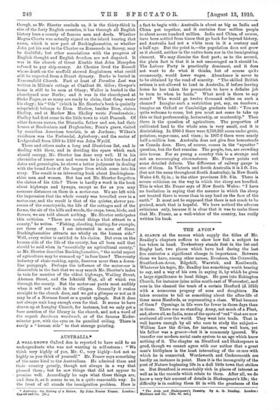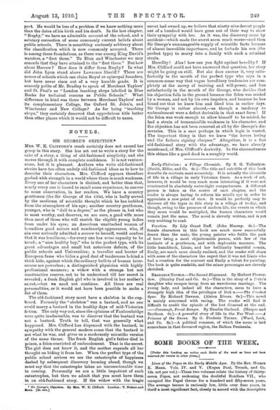THE AVON.*
A GLANCE at the names which supply the titles of Mr. Bradley's chapters suffices to show bow full a subject he has taken in hand. Tewkesbury stands first in the list and Rugby last, two places which have had during the last five centuries a significant change in importance. Between these we have, among other names, Evesham, the Cotswolds, Stratford-on-Avon, Edgehill, Warwick, and Kenilworth. Whatever his topic, Mr. Bradley has something worth hearing to say, and a way of his own in saying it, by which he gives a large sig,nificance to local things. He goes into Eckington Church, for instance (nine miles south-east of Worcester), and sees in the chancel the tomb of a certain Hanford (d. 1616) with a numerous progeny of sons and daughters. He takes occasion to tell us something about the after-life of these same Hanfords, as representing a class. What became of them ? Openings in life were far fewer in those days than in these. There was no standing Army, not much of a Fleet, and, above all, no India, none of the spots of "red" that are now scattered all over the world. They went into trade. That is well known enough by all who care to study the subject— William Law the divine, for instance, was well born, yet his father was a grocer—but it is commonly ignored. We transfer our modern social caste system to an age which knew nothing of it. The chapter on Stratford and Shakespeare is good, though we cannot agree with our author that a great man's birthplace is the least interesting of the scsnes with which he is connected. Wordsworth and Cockermouth are hardly an instance in point. Here it is the incongruity of the poet of Nature beginning life in a dull little town that strikes us. But Stratford is remarkably rich in places of interest as well as in the records which relate to them. After all, we do know a very fair amount of details in Shakespeare's life ; the difficulty is in making them fit in with the greatness of the • Tko Aeon and Shakaspearet Country. By A. G. Bradley. London: Methuen and Co. [lOs, dd. net.]
poet. He would be less of a problem if we knew nothing more than the dates of his birth and his death. In the last chapter, "Rugby," we have an admirable account of the school, and a salutary correction of some commonly current beliefs about public schools. There is something curiously arbitrary about the classification which is now commonly accepted. There is among these foundations, as there was among King David's warriors, a "first three." To Eton and Winchester we may concede that they have attained to the "first three." But how about Harrow ? How does it differ from Rugby ? In what did John Lyon stand above Lawrence Sheriff ? There are scores of schools which can claim Royal or episcopal founders, but have never risen out of a very humble grade. It is scarcely polite of Mr. Bradley to speak of Merchant Taylors' and St. Paul's as "London teaching shops labelled in Blue Books for technical reasons as Publics Schools." What difference in kind was there between Merchant Taylors' and Its complementary College, the Oxford St. John's, and Winchester and New College? As for being "teaching shops," they certainly deserved that opprobrious title better than other places which it would not be difficult to name.







































 Previous page
Previous page